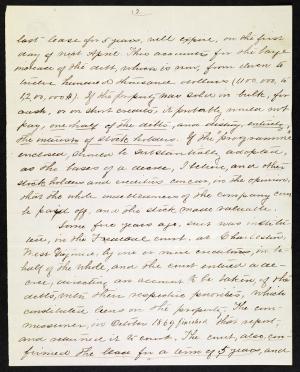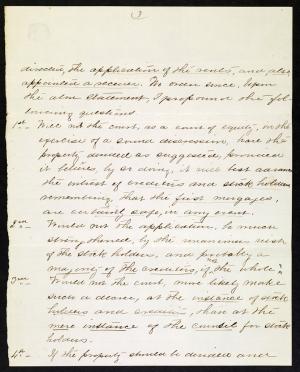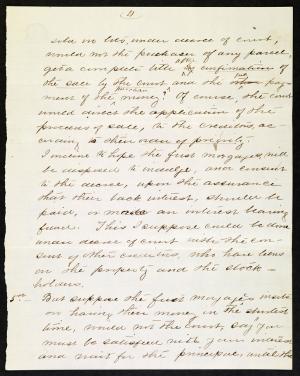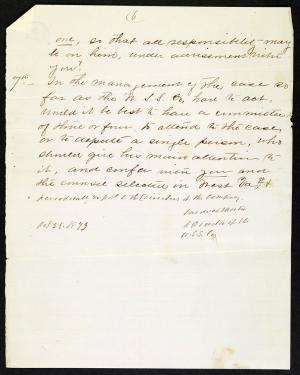White Sulphur Springs: Statement from Jeremiah Morton, a Director of the White Sulphur Springs Company, October 25, 1873
Morton describes the sad state of the financial affairs of the White Sulphur Springs Company. Dealt a crippling blow by the war and an investment in Confederate bonds, the Company is beset by liens, creditors, and debt. He seeks the help of the federal court.
This is one of many documents concerning White Sulphur Springs in the Papers of Jeremiah Morton and Joseph J. Hasley manuscript collection in Special Collections, University of Virginia Library.
Statement
The White Sulphur Springs, in Greenbrier County, West Virginia, were purchased in 1857 for the sum of $600.000. The vendees obtained a charter, and it was incorporated with a capital of a million of dollars. In the charter the whole property, was declared to be personal estate. The company expended large sums in buildings and the improvement of the property, and by adding interest, it now stands them, not less, than a million and a half of dollars. There are nine liens on it, consisting of morgages, deeds of trust and judgments, having their respective priorities. Two or three, if not more, of the deeds, direct the sale for cash, in case of default of payment. In the first year of the war, the furniture and stock on hand, were sold, and the proceeds vested in confederate bonds, which proves a total loss. In the prostrate condition of the company and the country, it was, leased, after the war, for a mere nominal sum. For 13 years (from Jany, ’61 to Jany ’74) it has been, mainly idle, and the last lease for 5 years, will expire, on the first day of next April. This accounts for the large increase of the debt, which is now, from eleven to twelve hundred thousand dollars (1,100.000, to 1,200,000$). If the property was sold in bulk, for cash, or in short credits, it probably would not pay, one=half of the debts, and destroy, entirely the interests of stock holders. If the “programme” enclosed, should be substantially adopted, as the bases of a decree, I believe, and other stock holders and crediters concur, in the opinion, that the whole indebtedness of the company can be paid off, and the stock made valuable.
Some five years ago, suit was instituted, in the Federal court, at Charleston, West Virginia, by one or more crediters, in behalf of the whole, and the court entered a decree, directing an account to be taken, of the debts, with their respective priorities, which constituted liens on the property. The commissioner, in October 1869 finished that report, and returned it to court. The court, also, confirmed the lease for a time of 5 years, and directed, the application of the rents, and, also, appointed a receiver. No order since. Upon the above statement, I propound the following questions.
1st Will not the court, as a court of equity, in the exercise of a sound discussion, have the property divided as suggested, provided it believes, by so doing, it will best advance the interest of crediters and stock holders, remembering, that the first morgages, are certainly safe, in any event.
2nd Would not the application, be much strong & hence, by the unanimus wish of the stock holders, and probably a majority of the crediters, if not the whole?
3rd Would not the court, more likely make such a decree, at the instance of stock holders and crediters, than at the mere instance of the counsil for stock holders.
4th If the property should be divided and sold no less, under decree of court, would not the purchaser of any parcel, get a complete title after confirmation of the sale by the court and the full payment of the money? …
… Oct. 25. 1873
Jeremiah Morton
A Director of the W.S.S. Co.





